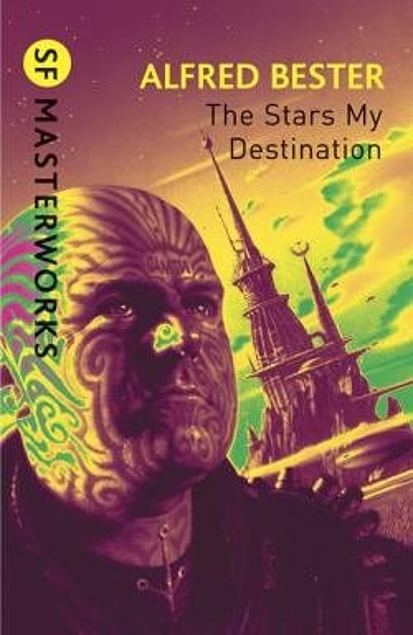Alfred Bester "The Stars My Destination" (Gateway SF Masterworks)

I liked this book, although I recommend it only cautiously. "The Star My Destination" was written by Hugo winner Alfred Bester in the mid-1950s, but manages to maintain relevancy today. As Neil Gaiman said in the foreword, many sci-fi novels are out-of-date within a few years, but this one manages to be relevant today and will for many years.
The story of Gully Foyle starts with him marooned in space, and quickly leaps to the center of the action. Gravelly, violent, and raw, the plot is in your face and wastes no time with the excess story or meandering character development. Bester tells you exactly what Gully is, and Gully is as predictable as intended. The rest of the characters tend to be paper-thin, but the point of the story is the story, not the characters.
As violent as the story is, however, there is a point to Bester's prescient story, and it makes the story worth the reading, even as bleak as the future in his world is. Gully, the desperate, violent, and vengeful everyman, discovers and uncovers a simple truth, a truth of power, of corruption, and the danger of unparalleled weapons in the hands of the few, rather than of the many. With the rise of nuclear weapons in the 1950s, it is not unbelievable that it was written in the same era as "The Lord of the Rings," also a story that has been noted for its analogical relationship to nuclear weapons. Bester and Tolkien were writing in their time, but the lessons may be as relevant today as it was then.

I liked this book, although I recommend it only cautiously. "The Star My Destination" was written by Hugo winner Alfred Bester in the mid-1950s, but manages to maintain relevancy today. As Neil Gaiman said in the foreword, many sci-fi novels are out-of-date within a few years, but this one manages to be relevant today and will for many years.
The story of Gully Foyle starts with him marooned in space, and quickly leaps to the center of the action. Gravelly, violent, and raw, the plot is in your face and wastes no time with the excess story or meandering character development. Bester tells you exactly what Gully is, and Gully is as predictable as intended. The rest of the characters tend to be paper-thin, but the point of the story is the story, not the characters.
As violent as the story is, however, there is a point to Bester's prescient story, and it makes the story worth the reading, even as bleak as the future in his world is. Gully, the desperate, violent, and vengeful everyman, discovers and uncovers a simple truth, a truth of power, of corruption, and the danger of unparalleled weapons in the hands of the few, rather than of the many. With the rise of nuclear weapons in the 1950s, it is not unbelievable that it was written in the same era as "The Lord of the Rings," also a story that has been noted for its analogical relationship to nuclear weapons. Bester and Tolkien were writing in their time, but the lessons may be as relevant today as it was then.